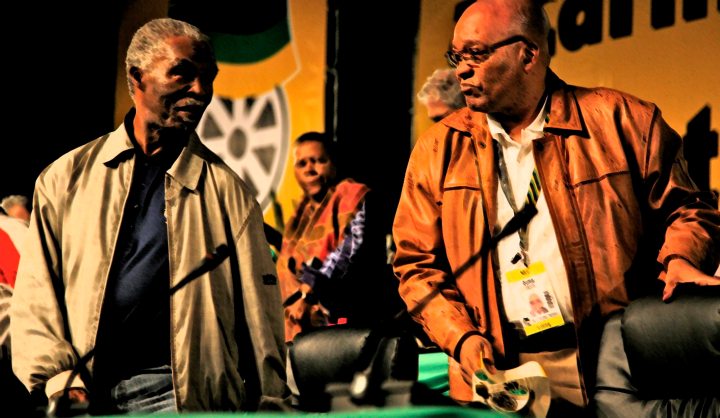South Africa
Op-Ed: Thabo Mbeki’s presidential letters that would save his legacy

Poor, poor Thabo Mbeki. He is not having a good 2016. Poor, poor Jacob Zuma: his is worse. So different in their sense of themselves, both are paying for the same flaw; neither was capable of conducting a transparent presidency. In this both are so far from Nelson Mandela, who told reporters much of his thinking in real time. By JOHN MATISONN.
Mbeki, the great conspirator, is now well into his twelve-part series on how he was conspired against. His letters no longer matter, but understanding him does, unless you believe history should be swept under the carpet. Needless to say, I don’t.
It is plain that he has lost all discernment about what his country needs. Did he ever have any?
Yet Mbeki could write a string of letters the country would read. It’s not that he doesn’t know anything we are interested to hear. He just doesn’t seem to consider telling us.
To help him out, here are a few subjects for letters the country might read if he spoke frankly about them.
- What talents did you see in Jacob Zuma that made you chose him above all the other talented leaders in the ANC to be your deputy president? After so many years working so closely together, you must have understood his level of numeracy, something the rest of us are only realising now, as R60 million morphed into R240 million, which we then saw in videos of the Nkandla interiors bought a shambles. These are not things you can ignore if you have even a limited grasp of costs. Why, Mr President, did you choose Mr Zuma for this responsible position in our country, opening the way for him to reach such power?
- Have you, with hindsight, faced up to your mistakes in compromising the Chapter Nine bodies which Zuma only extended when he pressed the ANC to abuse the redoubtable Public Protector, Thuli Madonsela? The examples are myriad. The best known was around the arms deal, where you compromised the processes the constitution painstakingly created: from removing Andrew Feinstein to neuter the Select Committee on Public Accounts (Scopa), your inappropriate meetings with the Auditor-General whose report then changed, to allowing Independent Broadcasting Authority councillors excoriated by ANC members of Scopa to receive ever higher promotions while the honest were side-lined (Disclosure: I was an IBA councillor at the time, but there were far bigger fish than me who were side-lined).
- What are your thoughts on the decline of South Africa’s standing in African education rankings? Most independent experts point firstly to the teachers: a good teacher under a tree will get better results than a weak teacher in a new classroom. Why was this fact never addressed effectively? Was it the trade unions’ fault, or was it yours, in not wishing to challenge a voting block that became counter-productive to children’s education?
- Was there a better way to manage the privatisation of state assets (Iscor and Telkom) and allowing South African companies free reign to relocate overseas and cut their commitments to South Africa? Few of these decisions have served South Africa well. This raises complex questions for which we have too little information to come up with obvious solutions, but in an accountable democracy we trust the electorate to debate issues and reach decisions based on good information. We need that debate to be intelligent and informed, but without more engagement from those who decided, we may find we have the debate anyway without the tools to find better options.
- Why did you reject out of hand the Van Zyl Slabbert Commission’s recommendations as mandated by the constitution for an improved electoral system? We never really did have a proper public debate about the pros and cons of the issue. While there are legitimate concerns that a pure constituency-based system would further racialise parliament by creating MPs representing only blacks and others only whites, the Slabbert option took care of that by creating constituencies with several MPs. This idea represents advanced expert thinking around the world, and it removes the serious problem we have now, that MPs are answerable to their party leadership, not to their voters. This could be called a constitutional crisis: while we have more than 12,000 protest demonstrations a year and counting, we almost never see the local MP, MPC or even town councillors playing the mediating role which should be a prime way a democracy should work. Have you changed your mind? Please tell us.
- Why did you keep cabinet ministers like Dr Ivy Matsepe-Casaburri in her post for almost ten years despite South Africa’s ever-declining place in world internet rankings and the failure of Telkom to increase service to the poor? Advancing the Information Economy was a primary goals, to bridge the digital divide and create good, above-ground jobs for black South Africans. Yet you dropped the ball.
- You have, due credit to you, admitted your role in failing to heed expert advice and build new electricity plants in time. But why were you ignoring sustainable energy, another massive new sector that is especially appropriate for South Africa both because we do not produce oil, and because motor manufacturing is so significant here, and we will be overtaken by foreign electric cars if we do not stay ahead of the curve?
It is now pretty clear that you were given bad intelligence on Zimbabwe, both from the highest levels and through your own intelligence services, in the early days of that country’s decline. You were acting in the belief that the opposition Movement for Democratic Change was both the primary promoter of violence and that it was not an indigenous opposition, but neither of those facts were true. It led to huge job losses in Zimbabwe, serious human rights and rule of law violations, and millions of refugees fleeing into South Africa. That economy, South Africa’s biggest African trading partner, remains a shadow of its former self, posing a drain on South Africa instead of an economic growth partner. Any lessons there, Mr President? Anything those who follow you could learn from, or should we just accept the lessons offered by President Robert Mugabe’s other friend, Julius Malema? You had access to the best advice in the land, on every subject of importance. You must have useful information and ideas to share. You must have rethought some of your decisions. Someone in your shoes who cares about his country would surely want to pass on the experience of your life’s work? Or is that not how you think about it?
I said I would add HIV/AIDS, but that story is already well told and too depressing to repeat. Thankfully, under President Zuma, we have in Health Minister Dr Aaron Motsoaledi a dedicated public servant who understands the science and cares about every patient, a credit to the Hippocratic Oath he swore when he became a doctor. He is one of few first rate ministers still in your cabinet.
But senior ministers did not come to Zuma’s defence in the two-day debate on the State of the Nation Address, as they normally do. They dared not defend his Nkandla about-face or his Nene humiliation. In the end, transparency did come.
We now know that Des van Rooyen entered the Finance Ministry with two experts who said they were taking charge of signing off on funding decisions. Courageous civil servants in the Treasury starting with the director-general put their careers on the line to stop them, black businessmen and bankers told Zuma to reverse himself, and he did. He is the president, but he does not preside.
Zuma is Mbeki’s legacy. Working in the dark, they both dealt with challenges in the dark. It’s up to us to ensure the next president works in the light. For Mbeki to have any hope of recovering respect, the onus is on him to answer questions like these truthfully, without artful dodging or point scoring. DM
John Matisonn is the author of GOD, SPIES AND LIES, Finding South Africa’s future through its past.
Photo: Original photo of Thabo Mbeki and Jacob Zuma at the ANC’s Polokwane conference in December 2007 by Greg Marinovich.














 Become an Insider
Become an Insider